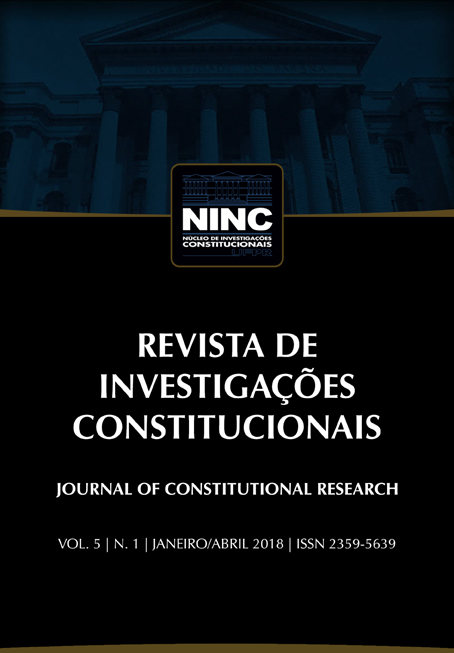TWAIL – “Third World Approaches to International Law” and human rights: some considerations
DOI:
https://doi.org/10.5380/rinc.v5i1.54595Palavras-chave:
TWAIL, Third World Approaches to International Law, International Law, Third World, Human Rights.Resumo
TWAIL is both a political and intellectual movement and, therefore, has multiple perspectives. While the first academic conference of TWAIL was held at Harvard Law School in March 1997, Third World perspectives of international law are part of a long tradition of critical internationalism. In this essay we will try to explain the meaning of the movement according to its most important scholars, and the TWAIL concern to the human rights discourse. It can be said that according TWAIL the historical model of human rights cannot respond to the needs of the Third World except if there is a radical rethinking and restructuring of the international order, abandoning the efforts to universalize an essentially European corpus of human rights.
Referências
BACHAND, Rémi. Critical Approaches and the Third World. Towards a Global and Radical Critique of International Law. Speech at University McGill, 24 mar. 2010.
BACHAND, Rémi. Les Third world approaches to international law: Perspectives pour une approche subalterniste du droit international. In: TOUFAYAN, Marc; TOURME-JOUANNET Emmanuelle; RUIZ FABRI, Hélène. Droit international et nouvelles approches sur le Tiers-monde: entre répétition et renouveau. Paris: Société de législation comparée, 2013
BADARU, Opeoluwa Adetoro. Examining the Utility of Third World Approaches to International Law for International Human Rights Law. International Community Law Review, London, vol. 10, n. 4, p. 379-387, 2008.
BAXI, Upendra. Too many or too few, human rights?. Human Rights Law Review, [s.l.], vol. 1, n. 1, p. 1-9, mar. 2001.
CHIMNI, B. S. Third World Approaches to International Law: A Manifesto. International Community Law Review, London, vol. 8, n. 1, p. 3-27, 2006.
GALLIÉ, Martin. Les théories tiers-mondistes du droit international (TWAIL). Un renouvellement? Revue Études internationales, vol. 39, n. 1, p. 17-38, mars 2008.
MUTUA, Makau. Change in the Human Rights Universe. Harv. Hum. Rts. J., Cambridge, vol. 20, p. 3-5, 2007.
MUTUA, Makau. Savages, Victims and Saviors. The Metaphor of Human Rights. Harvard International Law Journal, Cambridge, vol. 42, n. 1 p. 201-245, 2001.
MUTUA, Makau. The Ideology of Human Rights. Virginia Journal of International Law, Charlottesville, vol. 36, p. 589-658, 1996.
MAKAU, Mutua. What is TWAIL? American Society of International Law Proceedings, Washington, vol. 94, 31-38, 2000.
PARMAR, Pooja. TWAIL: An Epistemological Inquiry. International Community Law Review, London, vol. 10, n. 4, p. 363-370, 2008.
SHETTY, Vikrant Dayanand. Why TWAIL Must Not Fail: Origins and Applications of Third World Approaches to International Law. King’s Student Law Review, London, vol. 3, n. 2, p. 68-82, apr. 2012.
SUNTER, Andrew F. TWAIL as Naturalized Epistemological Inquiry. Canadian Journal of Law & Jurisprudence, Cambridge, vol. 20, n. 2, p. 494-498, 2007.
Downloads
Publicado
Como Citar
Edição
Seção
Licença
Autores que publicam nesta revista concordam com os seguintes termos:- Autores mantém os direitos autorais e concedem à revista o direito de primeira publicação, com o trabalho simultaneamente licenciado sob a Creative Commons - Atribuição 4.0 Internacional que permite o compartilhamento do trabalho com reconhecimento da autoria e publicação inicial nesta revista.
- Autores têm autorização para assumir contratos adicionais separadamente, para distribuição não-exclusiva da versão do trabalho publicada nesta revista (ex.: publicar em repositório institucional ou como capítulo de livro), com reconhecimento de autoria e publicação inicial nesta revista.
- Autores têm permissão e são estimulados a publicar e distribuir seu trabalho online (ex.: em repositórios institucionais ou na sua página pessoal) a qualquer ponto antes ou durante o processo editorial, já que isso pode gerar alterações produtivas, bem como aumentar o impacto e a citação do trabalho publicado (Veja O Efeito do Acesso Livre).
























